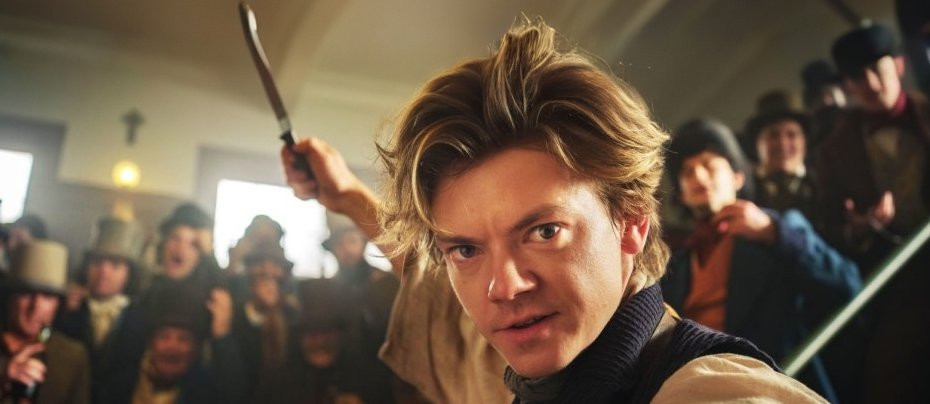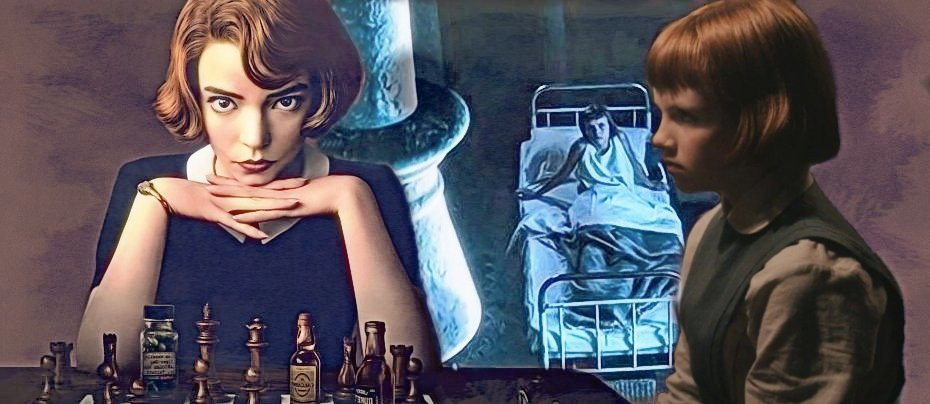
The Queen's Gambit
2020 - United StatesIt could not have been an easy "pitch": set in the high octane world of competitive chess, The Queen's Gambit is the story of a wholly fictional female player in the 1950s and 60s. Orphaned, she learns to play chess and turns out to be very good at it. She eventually gets adopted and wins a lot of chess matches. Then she loses a couple. Then she wins again. That is basically it.
There are no great twists or reversals or reveals, none of the stuff the scriptwriting books tell us really make a story exciting. There are no real villains or seemingly insurmountable obstacles. There is a subplot, and it cannot be called any more than that, about our heroine's apparent reliance on prescription medication and her drinking too much on occasion, but this is not at heart one of those powerful stories about overcoming addiction and alcoholism.
That The Queen's Gambit, having broken all the rules, was such a big hit with viewers and critics alike is due simply to it being a beautiful piece of craftsmanship - in its storytelling, its playing, and its production.
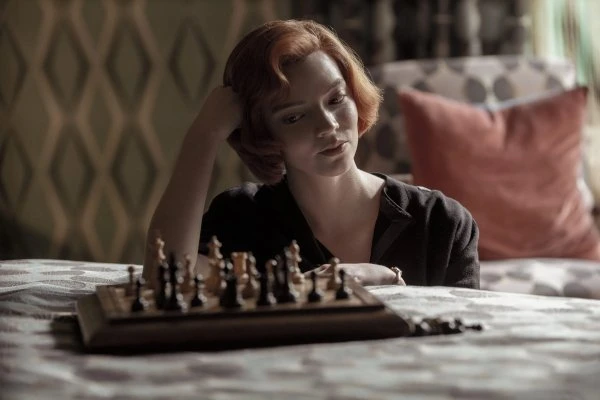
Apart from the easy to forget fact that its protagonist, Beth Harmon, is fictional, the structure of The Queen's Gambit is that of an old fashioned "biopic" or "miniseries" about a real person. The familiarity of this structure actually tricks us into thinking of Beth as a real person even when we know she is not. The absence of all those dramatic twists and reversals helps this process and actually makes the story more compelling. Audiences have become so used to those crude devices that they see them coming a mile away. We take it for granted that we are going to be surprised so that it comes as a surprise, a pleasant surprise, when things work out as they probably would in the real world.
The script seems to toy quite deliberately with our expectations. We think we know where it is going when we see the stern looking ladies at the dour orphanage, the old janitor who looks like a creepy loner, and the beaten down adoptive mother whose dreams have been destroyed. We are wrong, sometimes very wrong.
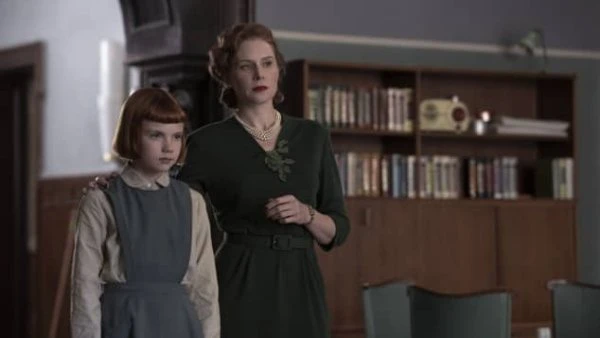
One of the great strengths of the characterisation is that it understands that hardly anyone is totally evil, and most people like to think of themselves as kind and helpful. There is nothing cruel about those stern ladies: they are doing a difficult job and their discipline is not unreasonable; their routine use of tranquilizers on young children, shocking as it now seems, was urged by "expert" opinion at the time; and when the director of the orphanage says it is not right for a young girl to spend so much time playing chess in the basement with the janitor, one can see her point of view - and then she immediately suggests alternative arrangements. The lonely janitor hides a truly noble soul. Instead of sinking into bitterness and imposing it on Beth, the adoptive mother helps her reach for own dreams.
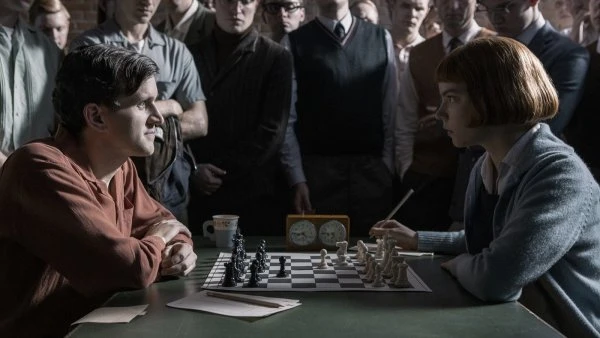
Initial antagonists among Beth's fellow chess players soon become friends and very obliging allies. At one point, a girl who gets her drunk on the eve of a big match seems as if she might be something more sinister, but the possibility is never developed. Even the closest person there is to a villain, Beth's adoptive father, who goes back on his promise to give her a house, can hardly be called evil since, as he points out, he worked for years to make the payments on it.
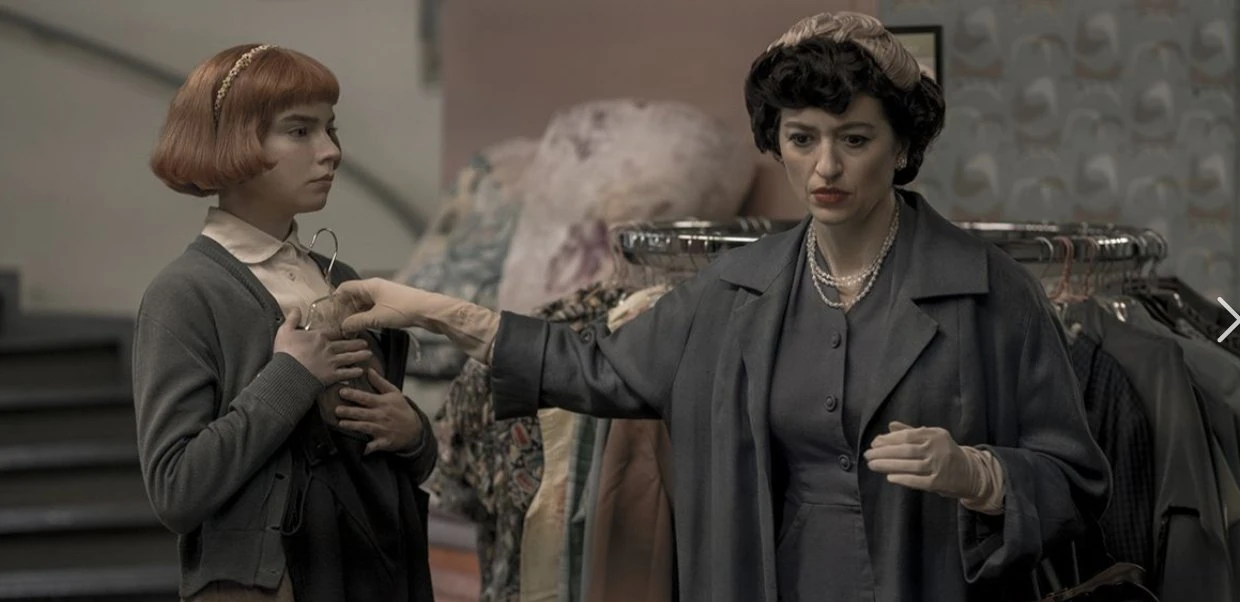
It does not need to be emphasised that chess has always been seen as very much a male activity. Until recently all Grandmasters were men. To show a woman playing and beating them, especially in the 1960s, is therefore in itself a feminist statement. In making that statement, The Queen's Gambit does not over-egg the pudding. The usual clichés are avoided. There are no foolish men angered at the very thought of a woman playing chess with nothing better to do than obstruct her. Beth is not oppressed. She does not go to court or lead a march on Congress for the sake of women everywhere, complete with stirring music. Her only real difficulties, easily overcome, are social expectations. Her adoptive mother, later a strong supporter of her chess career, once asks if she would not rather have dancing lessons, and the boys on the door at her first chess tournament suggest, politely, that she might do better in the beginner's section - not because they are misogynist but because she is in fact, at that point, a beginner.
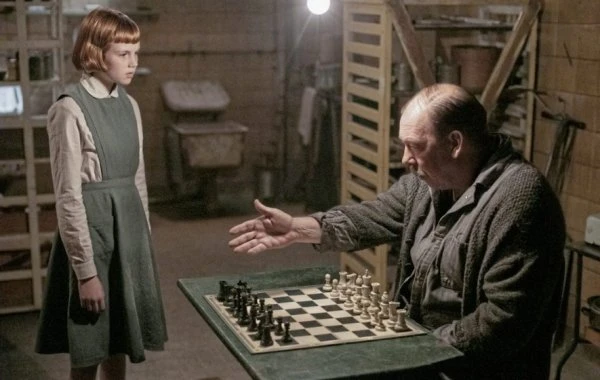
The only person who exclaims that girls do not play chess is the janitor, Mr Shaibel, who then proceeds to teach her the game and proves her greatest benefactor. Other shows with a political point to make could learn from this. If you have a message you want to give to the audience, it is more likely to get through if you do not scream it at them. Persuade them to want to associate themselves with the supportive people, even if that means overcoming initial reservations, rather than lambast them for being unsupportive.
The soul of the production is a truly amazing performance by Anya Taylor-Joy as Beth. She takes the character from an awkward teenager through growing awareness of her sexuality - her use of it to distract a young Russian player is as cringeworthy as it is compelling - to self confident womanhood with a technical skill incredible in one so young.
That skill solves the practical problem of how to dramatise chess, which is not exactly the most thrilling of spectator sports (a fact satirised cleverly in 'Comrade Detective'). We do not need to pay attention to the board at all. We can follow the progress of a match by looking at the emotions on Beth's face. One sees why Taylor-Joy got a whole shelf of Awards for the role.
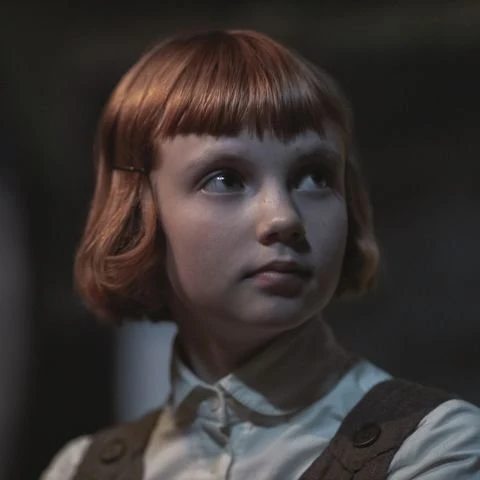
Credit is also due to Isla Johnston, who, playing Beth at nine, maintains exactly the same expression of wide eyed intensity as Taylor-Joy. Thomas Brodie-Sangster, apparently channelling Neil Patrick Harris, continues to move on impressively from his child actor image with a strong performance as an arrogant but immature champion. Bill Camp displays a subtle power as Mr Shaibel, and Marielle Heller keeps us guessing as Beth's adoptive mother: is she exploiting Beth or vice versa - or are they just two lonely women who need each other?
The sense of period is immaculate. The design departments deserve particular praise for avoiding the obvious clichés of Sixties fashion - which probably had minimal impact on suburban Kentucky and the chess circuit.

Yet, as often happens, that the production got so many details right only emphasises the fact that the script gets a lot of things wrong, or at least they are questionable, and when the viewer pauses to question is all it takes to interrupt the suspension of disbelief. For a start, there were successful women chess players in the 1960s, and it was not unusual for them to play and beat top level male players - a fact that, at the time of writing, has just prompted a lawsuit. There were, however, no female Grandmasters (as opposed to Woman Grandmasters, something else altogether) until the 1970s. Not only did Beth, a woman capable of beating every Grandmaster, not exist, no one like her has ever existed. Even the best lose sometimes.

Beth's near total invincibility presents a dramatic problem as well as a factual one. She is what gamers call "over powered." In her rapid rise to the top one feels the need for a moment like the one in the film The Colour of Money when a low level hustler, played so memorably by Forest Whitaker, humiliates the overconfident protagonist. It is curious that this thought occurred spontaneously while watching - because later research revealed that The Queen's Gambit and The Colour of Money are both based on novels by the same man, Walter Tevis.
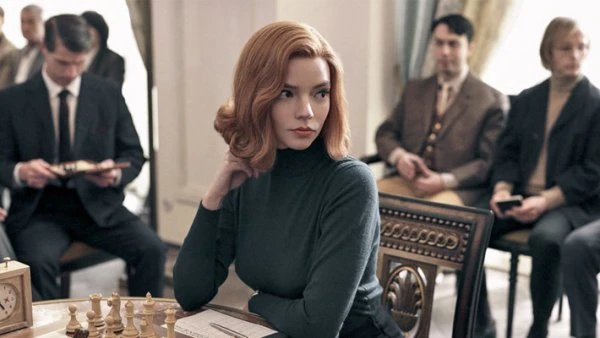
That moment of humility is necessary because, although the power of Taylor-Joy's performance distracts us, when one reflects on it afterwards one realises that Beth is not at all a nice person. We want her to succeed because she has had a difficult early life and it is pleasant to think that we are given something in this life to make up for the hard times, but her motivation is and remains totally self centred. A lot of other people go out of her way to help her on her journey but she gives nothing back - literally: she never even repays Mr Shaibel the ten dollars he loans her to enter her first chess tournament. She moans that the Chess Federation is not supportive because it thinks she has not done enough for chess. One suspects the Federation may be in the right for we never see her encouraging other players. She then turns to Church and State for support - and gets some - only to treat both scornfully. She has no alternative higher cause to put in their place. When people are rejoicing at her final victory, there is no real justification. It is only the triumph of an individual over another. Boxing analogies are strangely applicable to the chess matches, and here there is none of the broader significance of Rocky beating Drago.
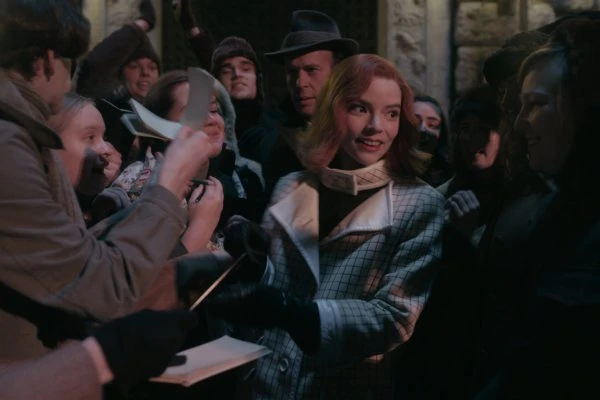
It is frustrating that Beth has such a deaf ear for the realities of Cold War politics, as does the production. There is a nod to American racial politics in the person of her best friend, Jolene, but the issues are never really explored. It would be quite interesting to find out more about such friendships in 1950s Kentucky. Were they frequent? Were they in any way discouraged, especially in official organisations like orphanages? In the end, poor Jolene is just another example of that increasingly dated trope, "The Magical Negro" - to use Spike Lee's words - the ethnic minority character whose only narrative function is to help the white protagonist on their way. Jolene (Moses Ingram) just turns up out of the blue after many years at a crucial moment and soon afterwards offers Beth her life savings to go to another chess tournament. There used to be a name for this, the thing where black people do the work and white people get the money.
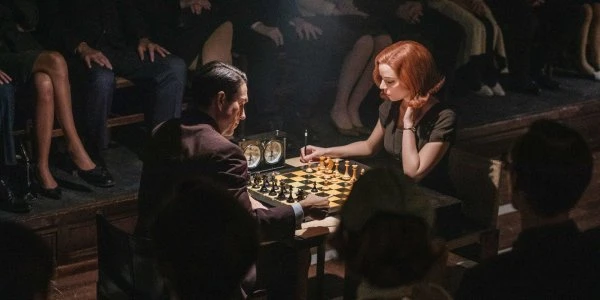
If these flaws grate is because they spoil an otherwise outstanding production. Overall, The Queen's Gambit is still seven hours of well crafted television that bear comparison with the classics from "The Golden Age of Miniseries" in the late 1970s and early 80s. It shows the advantages of telling a story straight rather than trying to be clever for the sake of looking clever. It marks Turner-Joy, previously known for the likes of Atlantis and Peaky Blinders as a star to watch in the near future. Above all, it pulls off the miracle of making chess sexy.
Seen this show? How do you rate it?
Seen this show? How do you rate it?
Published on November 2nd, 2021. Written by John Winterson Richards for Television Heaven.






